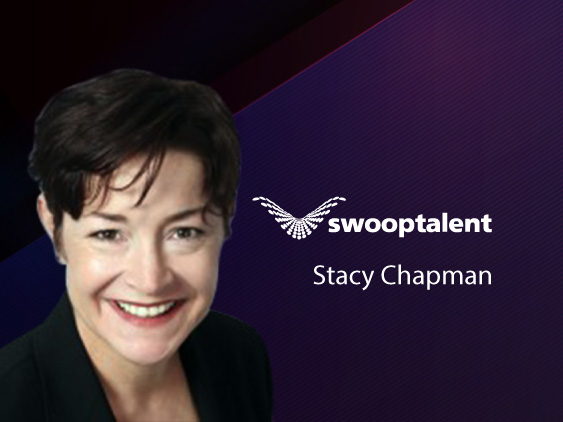Stacy Chapman, CEO and Co-founder of SwoopTalent, an automated talent data management platform joins us in this TecHRseries interview to share her views on what it takes for HR teams to leverage on data and analytics to optimize their recruitment process while also sharing her thoughts on the Future of Work and the Future of HR Tech.
Catch the complete interview:
______
Hello Stacy! Please tell us about yourself and your in HR/HR Tech. What led you to start SwoopTalent? What’s been your biggest entrepreneurial takeaway since starting?
I have been working in lots of roles in HR Tech since the 1990’s. Over those years you can imagine the number of problems I’ve seen that could just be solved by a seamless integration across all the systems and data, right? Well, we are solving that at SwoopTalent. My co-founder Satish and I met back at PeopleSoft in 2002 when we acquired his company, so it was a lot of shared experiences before we started SwoopTalent. My biggest takeaway, even if it’s not a surprise, is that what matters most is the team you build!
Read More: TecHR Interview with Dr. Bradley Smith, President and Co-Founder of PeopleKeys
The skills gap in the B2B/Tech industry is something that organizations can’t ignore. Can you throw light on some useful (and fast acting) upskilling and reskilling activities that HR teams can implement in their organizations.
We use self-directed teams to help our people grow their skills and in-depth understanding, and we do a lot of environment scanning to keep an eye on emerging technology and wider issues such as bias in AI. And of course we offer access to skills training and ensure everyone in the team has a skills development plan, which is a mix of company needs and their own career goals. I think offering that mix is important, because people have careers that go further than a single company, no matter how good the experience at that company is.
Given the growing issue of skills gap in the industry, how would you suggest professionals belonging to evolving roles like Marketing and Sales (where Martech-SalesTech usage lays the groundwork of successful campaigns today) train themselves to stay abreast of industry requirements and changes? Also, how do you see the role of a typical B2B marketer or salesperson shape up with time, given this?
Keep a focus on lifelong learning. Whether you like listening, attending classes, reading or interactive courses, there are a gazillion ways you can acquire new skills and knowledge, and you’re mad if you don’t use them. I think these roles are constantly adapting to technology, but will always need to be really strong on understanding personas, value propositions and product-market fit. Regardless of how you deliver the message, the fundamentals of it need to resonate with your future customer.
Read More: TecHR Interview with Dr. Bradley Smith, President and Co-Founder of PeopleKeys
How can talent data management platforms play a bigger role in future-proofing organizations? How can firms more seamlessly connect their talent systems and data?
I really don’t like the term “future proofing”! I think what you shoot for is to try to anticipate what could happen with high impact, and also try to always be adaptable, so that you can change direction when you need to – because it is WHEN, not IF! So what we like to do is enable customers to have maximum flexibility to adapt. We do it by ensuring they have full control of the technology they can access and use, and that they never lose the data they might need in the future.
How can companies leverage public and private data to enhance recruiting and talent analytics?
In the past companies have unfortunately been stuck with silos of data, rarely getting to see across their own data, let alone also incorporating data about the market. By letting companies bring this all together, and doing things like normalizing job titles so you can always compare apples to apples, we let our customers see themselves in the bigger picture, as well as see their entire process from recruitment marketing to “where did my people go when they left”…and even beyond. Once you have the complete data picture, the questions you can ask really open up.
Looking at the dynamics of the marketplace, what are some of your predictions regarding the future of work and the future of HR Tech?
I’m hopeful that the promise of the remote workforce, self-directed teams and massive access to learning all come through. Certainly at our company they play a big part. In HR Tech the biggest looming issues are threefold: user expectations of tech, AI and machine learning, and an increasing focus on data privacy. AI and machine learning have enormous promise, but run badly they have the potential to amplify our current challenges more than solve them, so I’m hopeful HR and talent leaders will really take a stand on this. We need to protect data privacy of course, but also fight against bias on many fronts. Functional leadership from talent pros is the best path forward on that.
Your favorite hiring/leadership/HR tech quote?
“We cannot solve our problems with the same level of thinking that created them.” Albert Einstein
Tag (or mention/write about) one person in the industry whose answers to these questions you would love to read.
Maury Hanigan of SparcStart
Stacy Chapman is the CEO and co-founder of SwoopTalent, an automated talent data management platform. Stacy has been in HR tech for more than 25 years, in many, many different roles, including being a proud PeopleSoft alum. Her long term obsession with data has morphed lately to include a more broad focus on bias, AI and what redirects technology from a utopic to a dystopic outcome (and vice versa).


